Films with theme "Films about Jews and Judaism", sorted by revenue
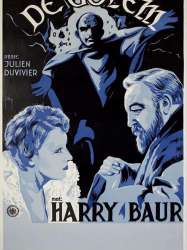
The Golem (1936)
, 1h40Directed by Julien Duvivier
Origin France
Genres Drama, Fantastic, Fantasy, Horror
Themes Films about religion, Théâtre, Films about Jews and Judaism, Films based on plays, Golem
Actors Harry Baur, Jany Holt, Roger Duchesne, Roger Karl, Charles Dorat, Truda Grosslichtová
In a Prague ghetto, poor Jews find themselves oppressed by Emperor Rudolph II (Harry Baur) which leads to talk among the Jews of re-awakening the Golem who is being held in an attic by Rabbi Jacob (Charles Dorat). During a food riot Rudolph's mistress, the Countess Strada (Germaine Aussey), is rescued by the enamored De Trignac (Roger Cuchesne) who gets hurt in the process. De Trignac is taken to Rabbi Jacob's house by his wife Rachel (Jany Holt). When Rudolph gets engaged to his cousin Isabel of Spain, it angers Strada who charms De Trignac to steal Jacob's Golem.

Yiddle with His Fiddle (1936)
, 1h32Origin Pologne
Genres Drama, Musical theatre, Musical
Themes Films about music and musicians, Films about religion, Musical films, Films about Jews and Judaism
Actors Molly Picon
Arye and his daughter Itke are musicians, or klezmorim, who became impoverished and were evicted from their home in Kazimierz. Arie sees no choice but to embark on a career of a travelling band, but fears for the safety of his daughter on the dangerous roads. Itke solves the problem by disguising herself as a boy and adopts the persona of "Yidl", ostensibly Arie's son. During their voyages, they meet another pair of merrymakers, the father-and-son duo Isaac and Ephraim Kalamutker, with whom they form a quartet and roam through the Polish countryside seeking engagements. "Yidl" falls in love with Ephraim, who is utterly oblivious to the true sex of his companion. The four are hired to perform in the wedding of young Teibele to the old, rich man Zalman Gold. The bride had to cancel her prior engagement with her true love, Yosl Fedlman, for her late father left many unpaid debts. Yidl takes pity on Teibele and the quartet smuggle her out of the party and have her join them as vocalist. To Yidl's dismay, Ephraim is enamored with the young woman. Itke reveals her true self to Isaac, who determines to assist her and leaves to locate Yosl. When arriving in Warsaw, the group become a success and are hired to perform in a concert. However, personal tensions between the members run high. Efraim signs a contract with a local orchestra. Teibele's lost match finally arrives, and they run off together before the show. Yidl, quite by accident, takes her place and recounts her entire story and love for Efraim in song form. She is applauded and signed on a contract for a career in the United States. Having learned the truth, Efraim abandons his commitments and joins her on the ship to New York.

Green Fields (1937)
, 1h39Directed by Edgar George Ulmer
Origin USA
Genres Comedy, Romantic comedy, Romance
Themes Films about education, Films about religion, Films about Jews and Judaism
Levy Yitzchok is an orphaned yeshiva student. Restless and distressed, he leaves his study hall in search of "real Jews" and wanders through the Belorussian countryside. He eventually settles in a small village, where the only Jews are two peasant families: Dovid-Noich, his wife Rochel, their two sons, Hersh Ber and Avraham Yankov, and daughter Tsine; and Elkone, his wife Gittel and their daughter Stera. Dovid is flattered by the presence of a scholar among the poor unlearned peasants, and invites Levy Yitzchok to stay as a boarder and tutor his two sons in religious studies. The phlegmatic, unworldly Levy is himself fascinated by the farmers' lives and their vitality. He is ashamed by his lack of physical prowess, which is demonstrated when he attempts to aid in field work. Levy secretly develops feelings for the youthful and vivacious Tsine, who in is impressed with him and begins to spy on her brothers' lessons; she herself is restricted from attending, but manages to learn to write her own name. Dovid quarrels with his neighbor, and the enraged Elkone cancels his daughter's match with Hersh. He offers Stera's hand to Levy. Elkone brings his daughter to Dovid's house, to annul her relations with the latter's son. She begins crying and Hersh is obviously depressed. The fathers are softened and agree to forget about their clash and allow them to marry. Levy Yitzchok and Tsine reveal their desires to one another, and announce they want their own wedding. The film closes with an ending title stating that from Palestine to Birobidzhan, the Jewish masses are no longer superstitious and subservient before Talmud scholars and that in the fusion of the learned Levy and strong-willed Tsine, "a new Jew is born.

Professor Mamlock (1938)
, 1h32Directed by Herbert Rappaport, Adolf Minkine
Genres Drama
Themes Films about religion, Political films, Films about Jews and Judaism
Actors Vasili Merkuryev
Professor Mamlock, a successful and respected Jewish surgeon, does his best to ignore the political crisis of the Weimar Republic. He is greatly troubled by the political tendencies of his son, Rolf, a passionate communist who is determined to resist the strengthening Nazi Party by all means. When the Nazis seize power and brutally crush all opposition, Mamlock is forced to leave his clinic for Jews are no longer allowed to practice medicine. He is dragged through the streets by SA men who emblazon his doctor's robe with the word "Jew". Mamlock, broken and humiliated, attempts suicide; at the last moment, an SA man arrives and convinces him to operate once more, to save the life of a high-ranking Nazi, promising that his rights will be restored. But Mamlock's hopes are frustrated when a Nazi activist in the clinic convinces the other doctors to blame him for various misdemeanors he did not commit. In the meantime, his son Rolf and another communist are arrested and brutally tortured. They escape and are hunted down by the police. When they hide in a store, the SA besiege them. A large crowd gathers in support of the communists, and the Nazis intend to shoot at them. Professor Mamlock, who hears the commotion from his house, carries a speech calling on the people to resist, having finally realized that his political apathy was a mistake. The SA kill him. Rolf, who has escaped, becomes leader of a new resistance movement.

The Street (1977)
Directed by Caroline Leaf
Origin Canada
Genres Drama, Comedy, Animation
Themes Films about religion, Films about Jews and Judaism

Rockinghorse (1978)
, 1h30Directed by Yaky Yosha
Themes Films about religion, Films about Jews and Judaism
Ami Susetz, an Israeli artist, abandons his wife and daughter in New York, and comes back to his home land after years of absence.
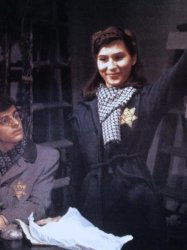
David (1979)
, 2h5Directed by Peter Lilienthal
Origin German
Genres Drama, War
Themes Films about religion, Political films, Films about Jews and Judaism
Actors Eva Mattes, Franciszek Pieczka, Dominique Horwitz, Gołda Tencer, Hanns Zischler

99 Dizengoff Street (1979)
, 1h50Directed by Avi Nesher
Genres Drama, Romance
Themes Films about religion, Films about Jews and Judaism
Actors Gali Atari, Anat Atzmon, Orly Silbersatz Banai
The film is about two guys, Natti (Gidi Gov), and Moshon (Meir Suissa), and a girl Ossi (Anat Atzmon) who live together in an apartment at 99 Dizengoff Street, Nightlife center of Tel Aviv. Ossi works for an insurance company and the three of them decide to make a movie using stolen equipment. While they are making movies, they are also having numerous romantic encounters, and having a good time.
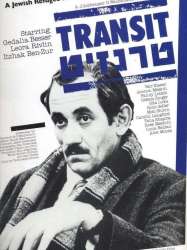
Transit (1980)
, 1h27Origin Israel
Genres Drama
Themes Films about religion, Films about Jews and Judaism
 , 1h
, 1hGenres Documentary
Themes Films about religion, Documentary films about historical events, Documentary films about politics, Documentary films about religion, Documentary films about anarchism, Political films, Films about Jews and Judaism
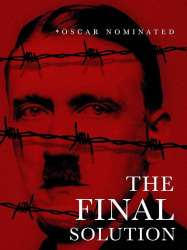 , 1h29
, 1h29Directed by Dieter Hildebrandt
Genres Documentary
Themes Films about racism, Films about religion, Documentary films about racism, Documentary films about law, Documentary films about war, Documentary films about historical events, Documentaire sur une personnalité, Documentary films about religion, Political films, Films about Jews and Judaism, Documentary films about World War II

An Intimate Story (1981)
, 1h27Directed by Nadav Levitan
Origin Israel
Themes Films about religion, Films about Jews and Judaism
Actors Chava Alberstein
The film follows a married couple, Leah (Chava Alberstein) and Ya'akov (Alexander Peleg), who live on a kibbutz in the 1970s. Over a period of ten years, all of their attempts to conceive a child have been unsuccessful and their marriage begins to disintegrate as each suffers silently and blames the other. Their difficulties are compounded – and the damaging effects of the lack of privacy in an insular communal environment underscored – when their inability to conceive becomes a matter of public knowledge and gossip among the kibbutz members.
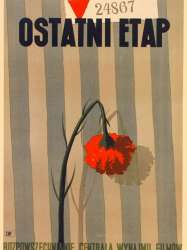
The Last Stage (1948)
, 1h44Directed by Wanda Jakubowska
Origin Pologne
Genres Drama, War
Themes Films about religion, Political films, Films about Jews and Judaism
Actors Aleksandra Śląska, Zofia Mrozowska, Huguette Faget, Alina Janowska, Jadwiga Chojnacka, Maria Kaniewska
Marta Weiss (Barbara Drapinska), a Polish Jew, arrives by cattle car to the Auschwitz concentration camp. While there she catches the attention of the guards as she is multilingual and is put to work as a translator. When she inquires about the factory at the camp a fellow inmate informs her it is a crematorium and that the rest of her family has likely been murdered.

Marriage in the Shadows (1947)
, 1h44Directed by Kurt Maetzig
Genres Drama
Themes Films about religion, Political films, Films about Jews and Judaism
Actors Ilse Steppat, Claus Holm, Hans Leibelt, Karl Hellmer, Willy Prager
Actor Hans Wieland refuses to divorce his actress wife, Elisabeth, who is Jewish, even as extreme pressure is applied on him by the Nazi authorities. He even takes her to a premiere of one of his films where she is unwittingly introduced to a high Nazi Party official. Upon later discovering that the charming woman at the premiere was in fact Jewish, he orders her arrest. Hans Wieland is given an ultimatum by his former friend Herbert Blohm, now a Nazi official at the Reichskulturministerium (culture ministry), to save himself by divorcing his wife. Knowing that his wife will die in a concentration camp, Hans Wieland returns home and they drink poison in coffee whilst reciting the closing scene of Friedrich Schiller's tragic play Kabale und Liebe together.
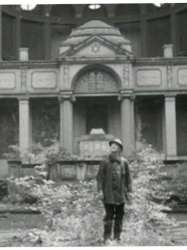
Singing in the Dark (1956)
Directed by Max Nosseck
Genres Drama, Musical, Crime
Themes Medical-themed films, Films about religion, Films about psychiatry, Films about disabilities, Political films, Films about Jews and Judaism
Actors Mickey Knox, Lawrence Tierney, Kay Medford, Wolfgang Zilzer
Leo, the main character, is a Holocaust survivor who suffers from total amnesia. When he immigrates to the U.S. he manages to find a job as a hotel desk clerk. When he accepts a drink in the hotel bar, he suddenly starts singing, amazing those around him—and himself—with his magnificent voice. Taking advantage of his gift, he begins singing in nightclubs. Eventually, with the help of a psychiatrist and partly as a result of a blow to the head during a mugging, his memories begin to return, and he realizes that he is the son of a great Jewish Hazzan (Cantor) in Europe. As memories of his parents, who perished in the Holocaust, return to him, he abandons his nightclub career to follow his father's footsteps as a synagogue cantor. The final scene shows Leo (who now remembers that his real name is "David") singing during a synagogue service.
 Connection
Connection